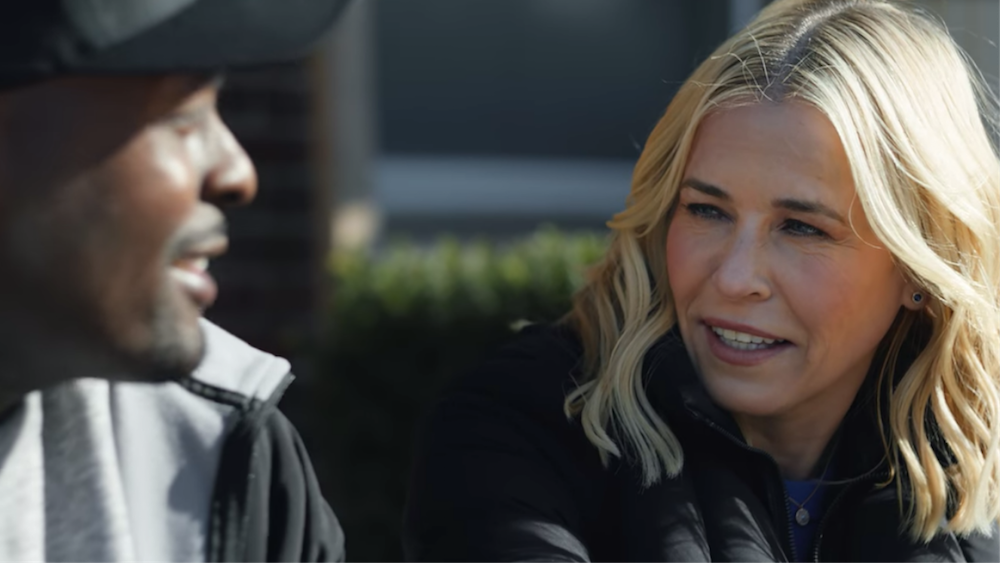This piece was submitted from a member of our enthusiastic community of readers. If you’re interested in sharing your opinion on any cultural, political or personal topic, create an account here and check out our how-to post to learn more.
Chelsea Handler is woke, at least according to her newest documentary Hello, Privilege. It's Me, Chelsea. Handler's career has remained successful despite her offensive, outrageous, and racist moments. She is now ready to dissect how a person as problematic as she was, maintained a successful career.
"I was white, and I was pretty, and I had a big mouth and for reason that was rewarded in Hollywood," she says early into the film. Now she is trying to figure out why she was able to stick around. In 2014, she wrote a book called Uganda Be Kidding Me, a title that should have ended her career, but didn't. In 2016, she believed that a racist joke she made about Angelina Jolie's son was still funny. Now in 2019, she gets to be an activist and taken somewhat serious in her new anti-racist frame of mind.
After a second look at the film, I have mixed feelings about her and this documentary. In some ways, she does hit the mark. Alex Stapleton, a Black woman, directs the film, and her deciding to listen more to what Black people have to say, even when it makes you feel uncomfortable, is important. Unfortunately, much of this documentary highlights that she still has a lot of work to do. She has small moments of reflection and acknowledgment of her privilege, but still lacks depth and understanding about how white privilege has shaped this country. I see the brown people cleaning her house in the opening credits and her driver who is a Black man. Not to mention the video of her humping a Black man. These images only reinforce the power of her whiteness.
Like so many white Americans, she has lived in a world where she didn't question her whiteness. Her identity is always affirmed and rewarded, and she believed the lie. Today she realizes that she is "clearly the beneficiary of white privilege." Now that she understands her privilege, she wants to move forward and do something about it. She decides that she wants to learn "how to be a better white person to people of color," yet she doesn't seem to acknowledge or take responsibility for past racist indiscretions. There is no remorse for her infamous book title or her racist jokes. Instead, she uses ignorant white people at Octokber Fest to highlight racism as comic relief and turns Tiffany Haddish's experience in Hollywood into an uncomfortable joke. We have seen these are old and tired tropes too many times before. Structural racism is much deeper than this. Does she understand that structural racism is what has rewarded her with her life? Very few Black people in this country can say they were able to walk away from the police without harm while engaged in illegal activities. This hurts deeply when we know that innocent Black people are killed too many times by police with no consequences.
This privilege allowed her to think of her past with her Black ex-boyfriend as only a dark period in her life. A man who would spend 14 years in prison, while she went on to have a successful career. How was she never able to question the differences between her life and his? How was she unable to see it for so long? But that is the privilege of whiteness — you don't have to see even when it slaps you in the face.
It could be all her experiences were leading her to this moment, a moment where she can reckon with herself and the privilege of whiteness. It is great that she is starting to realize that she would not have gotten away with her career if she were a Black woman. If she were a Black woman, she may not have gotten all the second and third chances. People can grow and change, but a documentary does not begin to uncover how racism has influenced this country.
Is Chelsea ready to take seriously what the Black woman at USC asked of her: “Where is the action going to start?” Is she ready to start putting her newfound awareness into tangible actions that affect change? Is she ready to be accountable for her past racist behavior? Is she ready for all the backlash, losing contacts and friends? Is she ready for what it entails when you are trying to dismantle a system that has reigned for over 400 years? We'll see.
